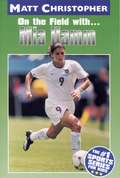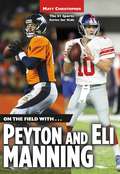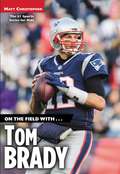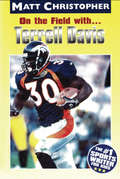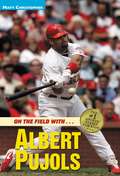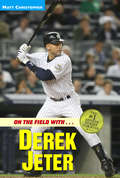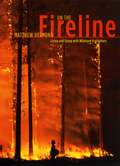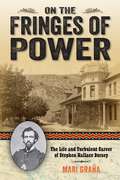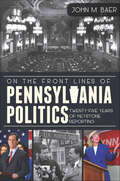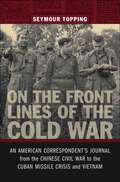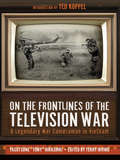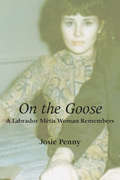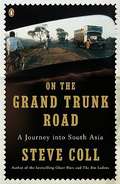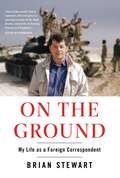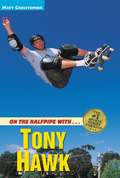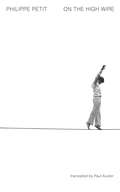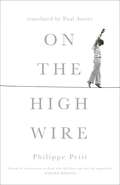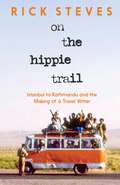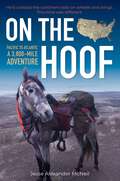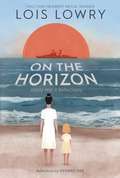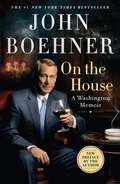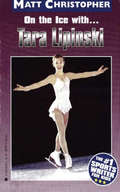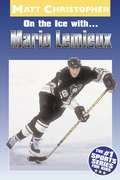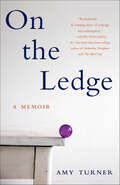- Table View
- List View
On the Field with...Mia Hamm: On the Field with...
by Matthew F ChristopherWomen's soccer has never been more popular. At the top of the sport's list of star players is Mia Hamm. Her speed, aggressive play, and ability to "read the field" have sparked every team she's ever played on. At the University of North Carolina, she helped the Tar Heels capture four NCAA championships. Her continually stellar performances with the United States national team led them to win two out of three Women's World Cups, first in 1991 and again in 1999. And as a member of the 1996 gold medal-winning Olympic team, she played an outstanding final game on a sprained ankle. The holder of the world record for most goals scored in a career, she is the hero of thousands of soccer fans worldwide. Readers will devour every detail of this insightful biography of the best women's soccer player in the world.
On the Field with...Peyton and Eli Manning (Matt Christopher)
by Matt Christopher Stephanie PetersNo other family has conquered football like the Manning's. It all started with the dad, Archie, a former pro quarterback who taught his sons Peyton and Eli to play football. Now, as the brothers have both grown into pro quarterbacks', they're creating a legacy of their own, starting with two stunning Super Bowl wins. This exciting Matt Christopher biography gives readers the story behind this famous football family, as well as thrilling recaps of some of the most awesome games in NFL history.
On the Field with...Tom Brady (Matt Christopher #1 Sports Series for Kids)
by Matt ChristopherDon't miss this action-packed and comprehensive look at the life and achievements of an NFL legend! With more Super Bowl appearances than any other player in NFL history, Tom Brady is a sports icon. From his college days as a backup quarterback at University of Michigan to his record-breaking number of winning seasons with the New England Patriots, this new and comprehensive biography gives fans a firsthand look at the highs and lows of the superstar's life and career, complete with stats and photographs.
On the Field with… Terrell Davis
by Matthew F ChristopherSuperstar running back Terrell Davis helped his team, the Denver Broncos, to two consecutive Super Bowl titles, first in 1998, then again in 1999. He holds multiple records, including those for postseason rushing average, consecutive 100-yard rushing games in the postseason, and best per-game rushing average. A unanimous Pro Bowl selection for 1999 -- his third straight year of playing in that game -- Davis was also named MVP and Offensive Player of the Year by the Associated Press for 1999.
On the Field with…Albert Pujols: On the Field with...
by Stephanie Peters Matthew F ChristopherAnyone who has ever had the privilege of watching Albert Pujols of the St. Louis Cardinals knows the sound of a hit. It's the sound his bat makes when it connects with the ball. It's a sound that's been heard countless times since his 2001 rookie season. That year, he took the league by storm by posting some of the most fantastic offensive stats of any rookie ever-and he's been doing the same ever since, shattering records and helping his team win games, including the 2006 World Series, with clutch hits and amazing home runs. This biography offers an up-close look at this superstar's life and the most memorable moments of his outstanding career to date.
On the Field with…Derek Jeter (Sports Bio Bookshelf)
by Matthew F ChristopherThe number one sports writer for kids discusses the personal life and baseball career of Derek Jeter, the young man from Michigan who achieved his dream to play shortstop for the New York Yankees. Includes career highlights and player's stats. Illustrations.
On the Fireline: Living and Dying with Wildland Firefighters
by Matthew DesmondIn this rugged account of a rugged profession, Matthew Desmond explores the heart and soul of the wildland firefighter. Having joined a firecrew in Northern Arizona as a young man, Desmond relates his experiences with intimate knowledge and native ease, adroitly balancing emotion with analysis and action with insight. On the Fireline shows that these firefighters aren’t the adrenaline junkies or romantic heroes as they’re so often portrayed.
On the Fringes of Power: The Life and Turbulent Career of Stephen Wallace Dorsey
by Mari GranaTouted in his time as one of the &“great men of the West,&” Stephen Wallace Dorsey was a Reconstruction carpetbagger who went to Arkansas and finagled and bribed his way into getting elected to the US Senate after living only two years in the state before heading West to seek his fortune. From a fraudulent New Mexico land claim to taking up mining claims and real estate in Southern California, he used sheer cunning and guile to manipulate the system of the Gilded Age to his own ends. Dorsey was a major presence in early New Mexico—which was no-holds-barred frontier corruption—with his flair for excess. Excess is in everything he did, his manipulative 600,000-acre-land-grab, his political shenanigans, his excessive drinking, his extravagant lifestyle always on display. In his fraudulent dealings he was caught out—not by the law, but those more conniving than he was. His fantastic mansion in the middle of a still-today empty prairie in northeastern New Mexico was of state-wide historical importance before the state could no longer afford to keep it.
On the Front Lines of Pennsylvania Politics: Twenty-five Years of Keystone Reporting
by John M. BaerEnjoy a fun look at behind-the-scenes politics and personalities in the history of Harrisburg and the Keystone State.Pennsylvania, first home of the Declaration of Independence and the Constitution, has a tradition of political progress. However, along with the good, the political playground of Pennsylvania has also seen the brazenly bad behavior of its political leaders. For over twenty-five years, political columnist John Baer has had a front-row seat to the foibles and follies of the Keystone State's political system. Baer takes readers through his memories of covering state politics for the last quarter century, from Democratic governor Milton Shapp's short-lived run for president--in which he finished behind "no preference" in the Florida primary--to highlights of some of the game-changing campaign missteps and maneuvers that moved administrations in and out of the capital. With a delightfully gruff wit, Baer gives readers a behind-the-scenes view of the politics and personalities that have passed through Harrisburg.
On the Front Lines of the Cold War: An American Correspondent's Journal from the Chinese Civil War to the Cuban Missile Crisis and Vietnam (From Our Own Correspondent)
by Seymour ToppingIn the years following World War II, the United States suffered its most severe military and diplomatic reverses in Asia while Mao Zedong laid the foundation for the emergence of China as a major economic and military world power. As a correspondent for the International News Service, the Associated Press, and later for the New York Times, Seymour Topping documented on the ground the tumultuous events during the Chinese Civil War, the French Indochina War, and the American retreat from Vietnam, Cambodia, and Laos. In this riveting narrative, Topping chronicles his extraordinary experiences covering the East-West struggle in Asia and Eastern Europe from 1946 into the 1980s, taking us beyond conventional historical accounts to provide a fresh, first-hand perspective on American triumphs and defeats during the Cold War era.At the close of World War II, Topping -- who had served as an infantry officer in the Pacific -- reported for the International News Service from Beijing and Mao's Yenan stronghold before joining the Associated Press in Nanking, Chiang Kai-shek's capital. He covered the Chinese Civil War for the next three years, often interviewing Nationalist and Communist commanders in combat zones. Crossing Nationalist lines, Topping was captured by Communist guerrillas and tramped for days over battlefields to reach the People's Liberation Army as it advanced on Nanking. The sole correspondent on the battlefield during the decisive Battle of the Huai-Hai, which sealed Mao's victory, Topping later scored a world-wide exclusive as the first journalist to report the fall of the capital. In 1950, Topping opened the Associated Press bureau in Saigon, becoming the first American correspondent in Vietnam. In 1951, John F. Kennedy, then a young congressman on a fact-finding visit to Saigon, sought out Topping for a briefing. Assignments in London and West Berlin followed, then Moscow and Hong Kong for the New York Times. During those years Topping reported on the Chinese intervention in the Korean conflict, Mao's Cultural Revolution and its preceding internal power struggle, the Chinese leader's monumental ideological split with Nikita Khrushchev, the French Indochina War, America's Vietnam War, and the genocides in Cambodia and Indonesia. He stood in the Kremlin with a vodka-tilting Khrushchev on the night the Cuban missile crisis ended and interviewed Fidel Castro in Havana on its aftermath.Throughout this captivating chronicle, Topping also relates the story of his marriage to Audrey Ronning, a world-renowned photojournalist and writer and daughter of the Canadian ambassador to China. As the couple traveled from post to post reporting on some of the biggest stories of the century in Asia and Eastern Europe, they raised five daughters. In an epilogue, Topping cites lessons to be learned from the Asia wars which could serve as useful guides for American policymakers in dealing with present-day conflicts in Afghanistan and Iraq.From China to Indochina, Burma to Korea and beyond, Topping did more than report the news; he became involved in international diplomacy, enabling him to gain extraordinary insights. In On the Front Lines of the Cold War, Topping shares these insights, providing an invaluable eyewitness account of some of the pivotal moments in modern history.
On the Frontlines of the Television War: A Legendary War Cameraman in Vietnam
by Yasutsune Hirashiki&“The eyewitness accounts of the many phases of the war in this memoir bring events to life as if they had happened yesterday&” (Vietnam Veterans of America Book Reviews). On the Frontlines of the Television War is the story of Yasutsune &“Tony&” Hirashiki&’s ten years in Vietnam—beginning when he arrived in 1966 as a young freelancer with a 16mm camera, but without a job or the slightest grasp of English, and ending in the hectic fall of Saigon in 1975, when he was literally thrown on one of the last flights out. His memoir has all the exciting tales of peril, hardship, and close calls of the best battle memoirs, but it is primarily a story of very real and yet remarkable people: the soldiers who fought, bled, and died, and the reporters and photographers who went right to the frontlines to record their stories and memorialize their sacrifice. If this was truly the first &“television war,&” then it is time to hear the story of the cameramen who shot the pictures and the reporters who wrote the stories that the average American witnessed daily in their living rooms. An award-winning sensation when it was released in Japan in 2008, this book has been completely recreated for an international audience. &“Tony Hirashiki is an essential piece of the foundation on which ABC was built . . . Tony reported the news with his camera and in doing so, he brought the truth about the important events of our day to millions of Americans.&” —David Westin, former President of ABC News
On the Goose: A Labrador Métis Woman Remembers
by Josie PennyA personal and inspiring story about a young Métis woman with a history of abuse who triumphed over a harsh start in life. Josie Penny’s life as part of a loving Métis family in an isolated corner of Labrador changed dramatically when she was taken away to a residential school. Abused by the students, Josie became increasingly angry and isolated from her family and community as she grew into her teens. At seventeen she left for Goose Bay to make her fortune and start her own life.On the Goose is the story of how Josie came to terms with her feelings of helplessness and isolation as she began to understand why she could not feel or express love. Josie Penny’s memoir is an inspiring true story of how love and hard work helped one woman triumph over adversity.
On the Grand Trunk Road
by Steve CollAvailable for the first time in paperback, Steve Coll's trek across a socially and politically damaged South Asia Bestselling author Steve Coll is one of the preeminent journalists of the twenty-first century. His last two books, the Pulitzer Prize-winning Ghost Wars and New York Times bestseller The Bin Ladens, have been praised for their creative insight and complex yet compelling narratives-and have put him on par with journalists such as the legendary Bob Woodward. Now, for the first time ever, the paperback edition of On the Grand Trunk Road is finally available, revised and updated with new material. Focusing on Coll's journeys in conflict-ridden India, Pakistan, Bangladesh, Sri Lanka, Nepal, and Afghanistan as a bureau chief for The Washington Post, On the Grand Trunk Road reveals a little-seen area of the world where violence, corruption, and greed have had devastating effects on South Asians from all walks of life. .
On the Grand Trunk Road
by Steve CollAvailable for the first time in paperback, Steve Coll's trek across a socially and politically damaged South Asia Bestselling author Steve Coll is one of the preeminent journalists of the twenty-first century. His last two books, the Pulitzer Prize-winning Ghost Wars and New York Times bestseller The Bin Ladens, have been praised for their creative insight and complex yet compelling narratives-and have put him on par with journalists such as the legendary Bob Woodward. Now, for the first time ever, the paperback edition of On the Grand Trunk Road is finally available, revised and updated with new material. Focusing on Coll's journeys in conflict-ridden India, Pakistan, Bangladesh, Sri Lanka, Nepal, and Afghanistan as a bureau chief for The Washington Post, On the Grand Trunk Road reveals a little-seen area of the world where violence, corruption, and greed have had devastating effects on South Asians from all walks of life.
On the Ground: My Life as a Foreign Correspondent
by Brian StewartA powerful memoir revealing the pressures, joys, and traumas of witnessing history up close and personal, from one of Canada&’s most prominent and decorated foreign correspondents.Brian Stewart is a trusted voice who brought stories of the world home to Canadians for decades on CBC&’s The National. He saw it all firsthand—triumph and ecstasy; carnage and unspeakable suffering—and bore the responsibility of shining a light on the most exciting and most horrifying moments of the late 20th century, including the Gulf War and the Ethiopian famine, reporting from sandstorms and shootouts, palaces and embassies. He spoke with the likes of Margaret Thatcher, Pope John Paul II, and Nelson Mandela; with armed militants, activists, aid workers, and more. Now, for the first time, he is sharing his experience of the cost, both personal and professional, of bringing truth home from around the world. Reading like a whirlwind trip through the highs and lows of modern history from one of its most passionate students, On the Ground brings politics, war, and social change to vivid life. An arresting tale of courage, curiosity, and empathy from a time when the news media held the public&’s trust, Stewart&’s honest and balanced storytelling is not only the fascinating tale of where one man&’s quest to witness history took him but also a sobering reminder of the staggering value of wise, responsible, and honorable journalism.
On the Halfpipe with... Tony Hawk (Sports Bio Bookshelf)
by Matthew F ChristopherDelving into the life of skateboarding sensation Tony Hawk, this biography examines how he began skateboarding at age nine and his performance at the 1999 ESPN X Games, where he astonished viewers by performing a trick thought impossible to do.
On the High Wire
by Philippe Petit“On the High Wire is fascinating to read. You will learn about the man, his work, his passion, his tenacity and lucidity” (Marcel Marceau) In this poetic handbook, written when he was just twenty-three, the world-famous high-wire artist Philippe Petit offers a window into the world of his craft. Petit masterfully explains how preparation and self-control contributed to such feats as walking between the towers of Notre Dame and the World Trade Center. Addressing such topics as the rigging of the wire, the walker’s first steps, his salute and exercises, and the work of other renowned high-wire artists, Petit offers us a book about the ecstasy of conquering our fears and reaching for the stars.
On the High Wire (W&N Essentials)
by Philippe PetitIn this poetic handbook, written when he was just twenty-three, the world-famous high-wire artist Philippe Petit offers a window into the world of his craft. Petit masterfully explains how preparation and self-control contributed to such feats as walking between the towers of Notre Dame and the World Trade Center. Addressing such topics as the rigging of the wire, the walker's first steps, his salute and exercises, and the work of other renowned high-wire artists, Petit offers us a book about the ecstasy of conquering our fears and reaching for the stars.
On the Hippie Trail: Istanbul to Kathmandu and the Making of a Travel Writer
by Rick StevesA NEW YORK TIMES BESTSELLER Stow away with Rick Steves for a glimpse into the unforgettable moments, misadventures, and memories of his 1978 journey on the legendary Hippie Trail. In the 1970s, the ultimate trip for any backpacker was the storied &“Hippie Trail&” from Istanbul to Kathmandu. A 23-year-old Rick Steves made the trek, and like a travel writer in training, he documented everything along the way: jumping off a moving train, making friends in Tehran, getting lost in Lahore, getting high for the first time in Herat, battling leeches in Pokhara, and much more. The experience ignited his love of travel and forever broadened his perspective on the world. This book contains edited selections from Rick&’s journal and travel photos with a 45-years-later preface and postscript reflecting on how the journey through Turkey, Iran, Afghanistan, Pakistan, India, and Nepal changed his life. You know Rick Steves. Now discover the adventure of a lifetime that made him the travel writer he is today.
On the Hoof
by Jesse Alexander McNeilThe true tale of a voyage that broke a man down and built him back up, with the help of one special horse.At 36 Jesse McNeil—at times carpenter, commercial fisherman, dabbler in real estate—decided to buy an untrained horse, make himself into a horseman, and ride all the way across the United States, from the Pacific to the Atlantic Ocean.A fiercely independent traveler, Jesse had navigated previous coast-to-coast trips—solo journeys by moped, bicycle, and small airplane. This time, however, he had a partner: a five-year-old Tennessee Walking Horse named Pepper. An inexperienced horseman with an equally inexperienced mount, Jesse would quickly discover the immense challenges of his new undertaking. Over the course of eight months and fourteen states—beginning in Oregon and ending on a beach in New Hampshire—he would be tested many times over as he learned not only what it took to keep Pepper safe and healthy, but the true value of qualities that he had once easily dismissed: patience and companionship.The generosity of strangers, from helpful ranchers and storekeepers to suburban families, shaped the pair's journey east. And while at some points the miles didn't unfold as Jesse hoped, others yielded unexpected events that changed his perspective—and quite possibly, his future. Written with honesty, grit, and grace,On the Hoofcaptures an arduous voyage that broke a man down and built him back up, with the help of one special horse.
On the Horizon
by Lois LowryFrom two-time Newbery medalist and living legend Lois Lowry comes a moving account of the lives lost in two of WWII&’s most infamous events: Pearl Harbor and Hiroshima. With evocative black-and-white illustrations by SCBWI Golden Kite Award winner Kenard Pak. Lois Lowry looks back at history through a personal lens as she draws from her own memories as a child in Hawaii and Japan, as well as from historical research, in this stunning work in verse for young readers.On the Horizon tells the story of people whose lives were lost or forever altered by the twin tragedies of Pearl Harbor and Hiroshima. Based on the lives of soldiers at Pearl Harbor and civilians in Hiroshima, On the Horizon contemplates humanity and war through verse that sings with pain, truth, and the importance of bridging cultural divides. This masterful work emphasizes empathy and understanding in search of commonality and friendship, vital lessons for students as well as citizens of today&’s world. Kenard Pak&’s stunning illustrations depict real-life people, places, and events, making for an incredibly vivid return to our collective past. In turns haunting, heartbreaking, and uplifting, On the Horizon will remind readers of the horrors and heroism in our past, as well as offer hope for our future.
On the House: A Washington Memoir
by John Boehner<P><P>Former Speaker of the House John Boehner shares colorful tales from the halls of power, the smoke-filled rooms around the halls of power, and his fabled tour bus. <P>John Boehner is the last of a breed. At a time when the arbiters of American culture were obsessing over organic kale, cold-pressed juice, and SoulCycle, the man who stood second in line to the presidency was unapologetically smoking Camels, quaffing a glass of red, and hitting the golf course whenever he could. <P>There could hardly have been a more diametrically opposed figure to represent the opposition party in President Barack Obama's Washington. But when Boehner announced his resignation, President Obama called to tell the outgoing Speaker that he'd miss him. "Mr. President," Boehner replied, "yes you will." He thought of himself as a "regular guy with a big job," and he enjoyed it. <P>In addition to his own stories of life in the swamp city and of his comeback after getting knocked off the leadership ladder, Boehner offers his impressions of leaders he's met and what made them successes or failures, from Ford and Reagan to Obama, Trump, and Biden. He shares his views on how the Republican Party has become unrecognizable today; the advice--some harsh, some fatherly--he dished out to members of his own party, the opposition, the media, and others; and his often acid-tongued comments about his former colleagues. And of course he talks about golfing with five presidents. <P>Through Speaker Boehner's honest and self-aware reflections, you'll be reminded of a time when the adults were firmly in charge. <P><P><b>A New York Times Best Seller</b>
On the Ice with… Tara Lapinski
by Matthew F ChristopherDescribes the life and skating career of the young woman who won a gold medal in figure skating at the 1998 Olympics.
On the Ice with…Mario Lemieux
by Matthew F ChristopherHockey has been a part of Mario Lemieux's life since his childhood. At the age of six he was holding his own against boys four years older; by the time he was sixteen, he had captured the attention of the National Hockey league, and soon after signed on with NHL's Pittsburgh Penguins. At the 2002 Olympic Winter Games he captained the Canadian hockey team, leading them in their gold medal winning performance.
On the Ledge: A Memoir
by Amy TurnerIn 1957, when Amy Turner was four years old, her father had to be talked down from a hotel ledge by a priest. The story of his attempted suicide received nationwide press coverage, and he spent months in a psychiatric facility before returning home. From then on, Amy constantly worried about him for reasons she didn't yet fully understand, triggering a pattern of hypervigilance that would plague her into adulthood.In 2010, fifty-five years after her father’s attempted suicide, Amy—now a wife, mother, and lawyer-turned-schoolteacher—is convinced she’s dealt with all the psychological reverberations of her childhood. Then she steps into a crosswalk and is mowed down by a pickup truck—an accident that nearly kills her, and that ultimately propels her on a remarkable emotional journey. With the help of acupuncture, somatic-oriented therapies, and serendipities that might be attributed to grace, Amy first unravels the trauma of her own brush with death and then, unexpectedly, heals the childhood trauma buried far deeper.Poignant and intimate, On the Ledge is Amy’s insightful and surprisingly humorous chronicle of coming to terms with herself and her parents as the distinct, vulnerable individuals they are. Perhaps more meaningfully, it offers proof that no matter how far along you are in life, it's never too late to find yourself.
